Grocery stores are often promoted as convenient locations where customers can drop off their plastic bags for recycling. But do grocery stores really recycle plastic bags? An investigation conducted by ABC News raises doubts about the effectiveness of plastic bag recycling programs at these establishments.
The investigation found that a significant number of plastic bags dropped off at grocery stores for recycling did not actually end up being recycled. Instead, many bags were sent to landfills, trash incinerators, or exported overseas to countries struggling with plastic waste imports.
This raises concerns about the true impact of grocery store recycling programs for plastic bags. Are these programs merely greenwashing efforts, or are they genuinely committed to recycling plastic bags and reducing plastic waste?
Table of Contents
Key Takeaways:
- The effectiveness of plastic bag recycling programs at grocery stores is called into question.
- Many plastic bags dropped off at stores for recycling end up in landfills, trash incinerators, or are exported overseas.
- Plastic bags pose challenges in the recycling process due to their thin and flexible nature.
- Increased transparency is needed to build trust and improve plastic bag recycling efforts.
- Reducing plastic use and promoting sustainable practices are essential in addition to recycling.
The Challenges of Recycling Plastic Bags
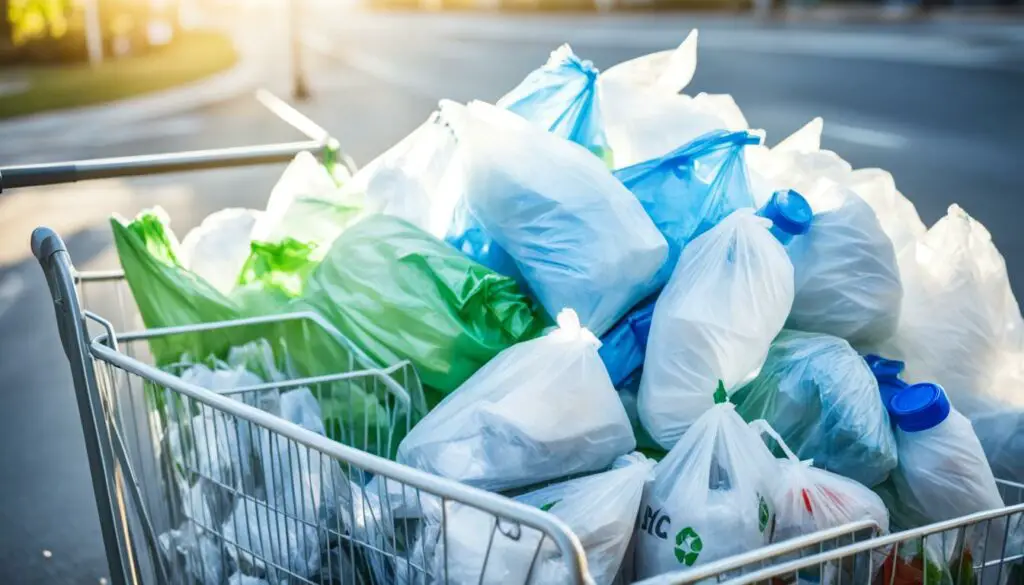
When it comes to recycling, plastic bags present unique challenges. Due to their thin and flexible nature, plastic bags are difficult and expensive to recycle. Recycling centers often face delays and increased costs due to the entanglement of plastic bags in recycling equipment. These challenges make it harder for grocery stores to effectively recycle plastic bags.
Despite industry efforts, such as the Wrap Recycling Action Program (WRAP), the recycling of plastic bags at grocery stores is not happening at the desired scale. This highlights the need for alternative solutions to reduce plastic waste at supermarkets.
“Recycling plastic bags requires special attention due to their characteristics. It is crucial for us to find innovative ways to recycle and reduce the use of plastic bags.”
One of the major hurdles in recycling plastic bags comes from their composition. Unlike other plastic containers, plastic bags are made from a low-density polyethylene (LDPE) film, which is harder to recycle. LDPE film can easily get caught in recycling machinery, leading to equipment breakdowns and disruptions in the recycling process.
The challenges faced in recycling plastic bags include:
- Thin and flexible nature, making recycling difficult and expensive.
- Potential entanglement in recycling equipment, causing delays and increased costs.
- Low-density polyethylene film composition, leading to difficulties in the recycling process.
To overcome these challenges, grocery stores and recycling programs need to explore new methods and technologies that facilitate the recycling of plastic bags. Additionally, consumers can play a vital role by reducing their use of plastic bags and opting for more sustainable alternatives.
By understanding the challenges and working together, we can find innovative solutions that promote the reduction of plastic waste at grocery stores.
| Challenges of Recycling Plastic Bags | Impact |
|---|---|
| Difficulty and expense of recycling | Increased costs for recycling centers |
| Entanglement in recycling equipment | Delays in the recycling process |
| Composition of low-density polyethylene film | Disruptions in the recycling process |
Tracking the Journey of Plastic Bags for Recycling
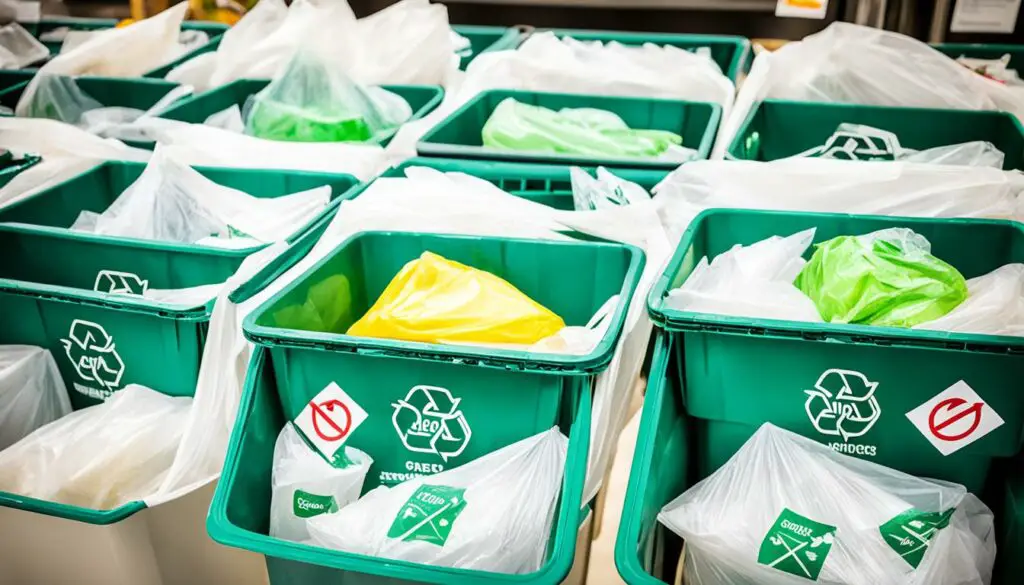
When it comes to plastic bag recycling, transparency is key. To gain insights into the actual fate of plastic bags dropped off at grocery stores, ABC News conducted an investigation. Tracking devices were discreetly placed inside plastic bags and then dropped off at various supermarkets across the country. These trackers allowed the team to monitor the bags and determine their final destination.
The findings of the investigation were concerning. Many of the tracked plastic bags did not end up at recycling facilities as expected. Instead, a significant number of bags ended up in landfills, trash incinerators, or were even exported overseas. Only a small percentage of the bags actually made it to the appropriate facilities involved in recycling plastic bags.
This raises doubts about the accuracy of claims made by grocery stores regarding their plastic bag recycling policies. Consumers who diligently drop off their plastic bags for recycling may be unaware that their efforts are not resulting in the desired environmental impact.
Quotes
“Our investigation revealed a shocking disparity between what consumers believe happens to their recycled plastic bags and the reality of their disposal,” said [insert professional name], [insert job title] at ABC News.
Supermarkets play an important role in shaping consumer behavior and promoting sustainable practices. Therefore, it is crucial for grocery stores to provide accurate information about their plastic bag recycling policies and ensure that these policies are effectively implemented.
Table:
| Destination | Percentage of Tracked Bags |
|---|---|
| Recycling Facilities | 16% |
| Landfills | 42% |
| Trash Incinerators | 24% |
| Exported Overseas | 18% |
The data presented in the table above illustrates the distribution of tracked plastic bags according to their final destination. It highlights the need for improved plastic bag disposal and recycling strategies in the supermarket industry.
Overall, the investigation emphasizes the importance of transparency in plastic bag recycling practices. Supermarkets should strive to ensure that the bags dropped off for recycling are indeed being properly recycled, and consumers should be informed about the journey of their plastic bags.
The Global Impact of Plastic Bags
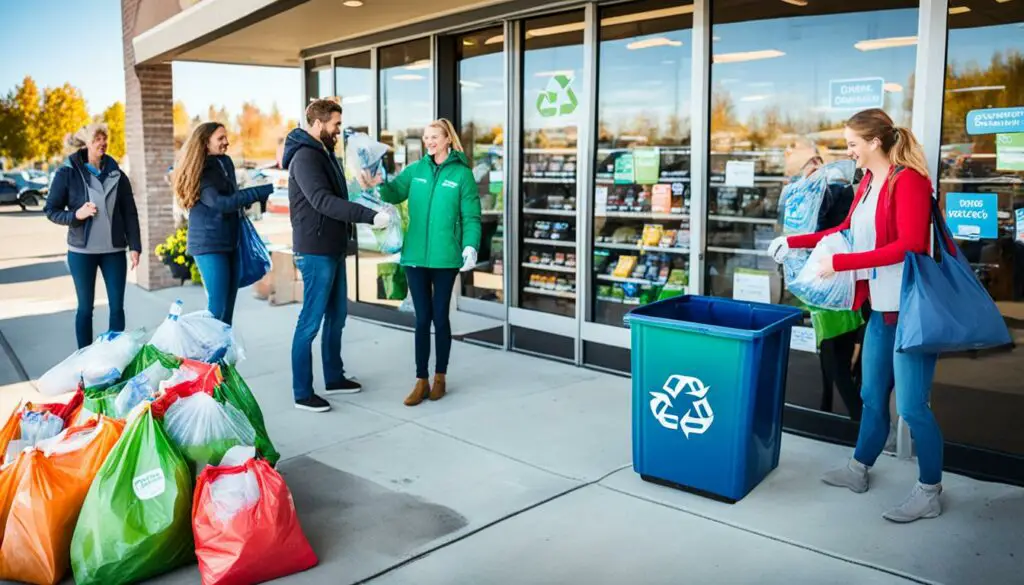
Plastic bags have a profound impact on the environment on a global scale. These bags often find their way into waterways and oceans, where they pose a significant threat to marine life. Mistaken for food, plastic bags can be ingested by marine animals, leading to injury or even death. The persistence of plastic bags is concerning, as they do not easily biodegrade and can take hundreds of years to decompose in landfills.
The production of plastic bags also contributes to environmental degradation. The manufacturing process requires a substantial amount of energy and water, contributing to carbon emissions and water scarcity. The extraction of raw materials, such as petroleum or natural gas, further depletes Earth’s resources.
To combat the detrimental effects of plastic bags, it is imperative for grocery stores to adopt sustainable practices. This includes reducing the use of plastic bags and promoting alternatives such as reusable bags or paper bags. Additionally, grocery stores must prioritize the recycling of plastic waste to prevent it from ending up in landfills or polluting natural ecosystems.
“Plastic bags are not just a convenience issue; they are an environmental challenge that requires collective action.”
– Jane Thompson, Environmental Advocate
By implementing measures that reduce plastic bag consumption and enhance plastic waste recycling, grocery stores can play a significant role in addressing the global impact of plastic bags. Sustainable grocery store practices can inspire positive change and set a powerful example for other industries and individuals alike.
Key Statistics:
| Fact | Statistic |
|---|---|
| Number of plastic bags used worldwide annually | Estimated at 5 trillion bags |
| Plastic bags disposed of in the oceans each year | Approximately 8 million metric tons |
| Time required for a plastic bag to degrade in a landfill | Up to 1,000 years |
These statistics highlight the urgency to address the issue of plastic bags and demonstrate the need for immediate action. By embracing sustainable grocery store practices and reducing plastic waste, we can mitigate the global impact of plastic bags and contribute to a cleaner and healthier planet.
The Challenges of Plastic Film Recycling
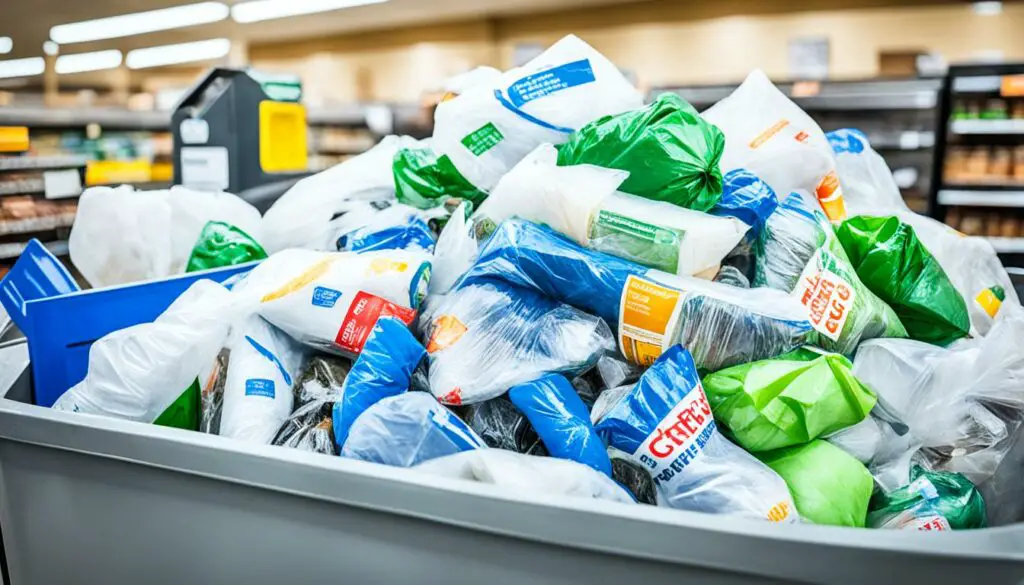
Plastic film, which includes plastic bags and other flexible packaging, presents significant challenges for recycling. Unlike rigid plastics, plastic film is thin, lightweight, and easily tangled. These properties make it difficult to process and recycle effectively. As a result, the recycling collection system for plastic film is not well-established, and finding viable markets for recycled plastic film is a constant challenge.
Many recycling centers and grocery stores have stopped accepting plastic film due to these difficulties. They face issues with processing the film and struggle to find reliable markets for the recycled material. This lack of transparency and infrastructure contributes to the uncertainty surrounding the recycling of plastic bags at grocery stores.
To address the challenges of plastic film recycling, it is crucial to improve the recycling collection and sorting systems. Implementing comprehensive recycling programs at grocery stores can help educate consumers and raise awareness about plastic film recycling. Additionally, developing partnerships with recycling facilities that specialize in processing plastic film can ensure a more efficient and effective recycling process.
“Improving the plastic film recycling infrastructure requires collaborative efforts from all stakeholders, including the plastic industry, recycling centers, and grocery stores. By working together, we can overcome these challenges and create a sustainable recycling system for plastic bags and other flexible packaging.”
Despite the challenges, it is important to keep striving for better plastic film recycling practices. Recycling plastic bags and other film packaging not only reduces waste but also conserves valuable resources and minimizes the environmental impact of plastic pollution. Together, we can make a difference by supporting recycling programs at grocery stores and choosing sustainable alternatives to plastic film.
The Importance of Reducing Plastic Use
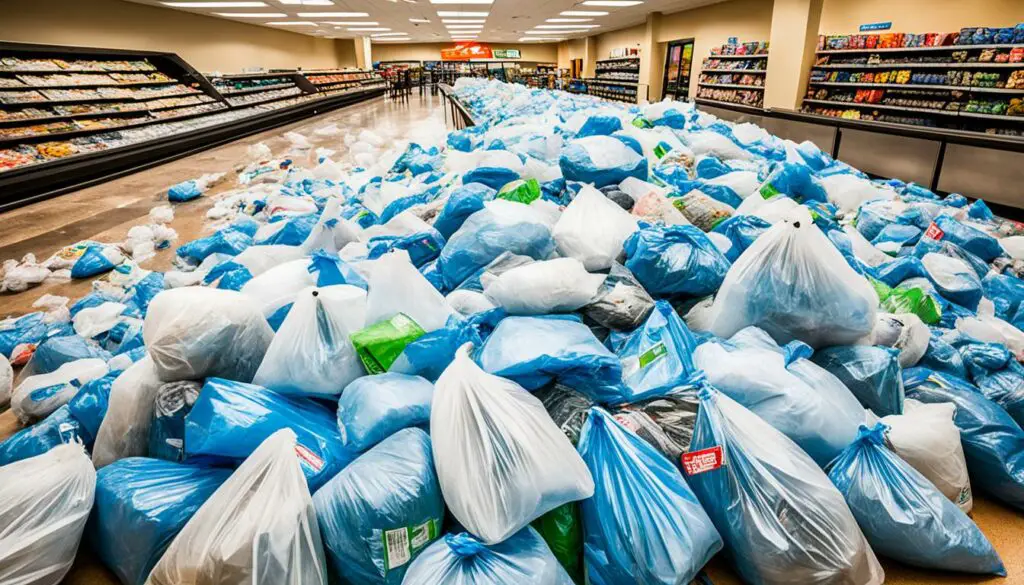
In addition to improving recycling efforts, it is crucial for grocery stores to focus on reducing plastic use. By implementing eco-friendly initiatives, such as charging for plastic bags or providing incentives for customers to bring their own bags, grocery stores can play a significant role in reducing plastic waste and promoting sustainable practices.
There are many alternatives to plastic bags readily available in the market. Reusable bags, made from materials like cotton or recycled fabric, can be used multiple times and help reduce the reliance on single-use plastic bags. Additionally, using paper bags, which are biodegradable and easily recyclable, can also significantly reduce plastic waste.
By charging for plastic bags, grocery stores can incentivize customers to bring their own bags and promote the use of reusable options. This not only reduces the consumption of plastic bags but also encourages shoppers to adopt more sustainable habits.
“By implementing eco-friendly initiatives, such as charging for plastic bags or providing incentives for customers to bring their own bags, grocery stores can play a significant role in reducing plastic waste and promoting sustainable practices.”
Furthermore, grocery stores can collaborate with local suppliers and brands to introduce innovative packaging alternatives. By utilizing compostable or biodegradable materials for packaging fruits, vegetables, and other products, grocery stores can further reduce plastic waste and contribute to a more sustainable future.
It is essential for grocery stores to raise awareness among their customers about the harmful impacts of plastic waste and the benefits of reducing plastic use. By educating shoppers about the importance of using reusable bags and choosing plastic-free alternatives, grocery stores can inspire positive change and drive the adoption of more sustainable shopping habits.
The table below highlights the environmental benefits of reducing plastic bag use:
| Benefits of Reducing Plastic Bag Use |
|---|
| 1. Reduction in plastic waste: By using reusable bags or paper bags, the amount of plastic waste generated from single-use bags is significantly reduced. |
| 2. Conservation of resources: Reusable bags require fewer resources for production compared to plastic bags, conserving energy and water. |
| 3. Protection of wildlife: Plastic bags can be mistaken for food by animals, causing harm to marine life and wildlife. Choosing alternative bags reduces the risk of ingestion and entanglement. |
| 4. Promotion of sustainable practices: Choosing plastic-free alternatives encourages shoppers to adopt more sustainable habits and supports the overall shift towards a greener future. |
By reducing plastic use, grocery stores can contribute to a cleaner environment, protect wildlife, and inspire customers to make sustainable choices. The implementation of eco-friendly initiatives plays a vital role in creating a more sustainable future and reducing the impact of plastic waste.
The Need for Increased Transparency
A lack of transparency in the plastic bag recycling industry contributes to public distrust and confusion. Consumers are often unaware of where their recycled plastic bags actually end up and whether they are being properly recycled. It is essential for grocery stores and recycling centers to provide clear information about their recycling processes and destinations. Increased transparency will help build trust and encourage greater participation in plastic bag recycling programs.
Why Transparency Matters
Consumers want to make informed choices about their recycling efforts, but without transparency, they are unable to determine if their actions are truly making a difference. When grocery stores and recycling centers are transparent about their plastic bag recycling practices, it allows consumers to have confidence that their efforts are being properly utilized and that the bags are being diverted from landfills and incinerators and instead are being recycled.
Building Trust Through Clear Information
Grocery stores and recycling centers can build trust with consumers by providing clear information about their recycling processes and destinations. This includes detailing the steps involved in the recycling process, the locations where the bags are transported, and the methods used to ensure proper recycling. By being transparent, grocery stores and recycling centers demonstrate their commitment to sustainability and show that they take responsibility for the plastic bags they collect.
“Transparency in plastic bag recycling programs is vital for building trust and encouraging consumers to participate. When people have clarity about where their recycled bags end up, they feel more confident about their recycling efforts and are more likely to continue recycling at grocery stores.”
Encouraging Greater Participation
Increased transparency in plastic bag recycling programs at grocery stores can also help generate greater participation. When consumers have trust in the recycling process, they are more likely to actively participate and bring their plastic bags to designated drop-off points at grocery stores. This increased participation can have a significant impact on reducing plastic waste and promoting sustainability.
Transparent Reporting and Accountability
Transparent reporting is crucial in ensuring accountability in plastic bag recycling programs. By providing regular reports on the quantity of bags collected, the percentage of bags properly recycled, and the environmental impact of recycling efforts, grocery stores and recycling centers can demonstrate their commitment to sustainability. This transparent reporting holds them accountable for their recycling practices and allows consumers to make informed choices about where they choose to recycle their plastic bags.
The Benefits of Transparency
Transparency in plastic bag recycling programs benefits not only consumers but also grocery stores and recycling centers themselves. It builds trust, enhances brand reputation, and can attract environmentally conscious customers. By being transparent about their recycling practices, grocery stores can differentiate themselves in the market and demonstrate their commitment to environmental sustainability. Additionally, transparency can foster collaboration between grocery stores, consumers, and recycling centers, leading to the development of more effective and efficient recycling systems.
The Role of Government and Industry
Government regulations and industry initiatives play a crucial role in addressing the challenges of plastic bag recycling and reducing plastic waste at grocery stores. By implementing policies that encourage the reduction of plastic use, promote the development of recycling infrastructure, and establish recycling standards, both the government and the plastic industry can have a significant impact on the sustainability of plastic bag recycling.
Government agencies can introduce legislation and regulations that incentivize grocery stores to adopt more sustainable practices, such as reducing the distribution of plastic bags or implementing effective plastic bag recycling programs. By providing financial support or tax incentives to stores that actively participate in plastic bag recycling initiatives, governments can encourage greater participation and create a more sustainable future.
Furthermore, industry initiatives are necessary to improve the recyclability of plastic bags. Plastic bag manufacturers and retailers should take responsibility for investing in technologies and processes that make plastic bags easier to recycle. This could involve exploring innovative materials or design modifications that enhance recyclability without compromising functionality or convenience.
“By working together, government, industry, and grocery stores can create a more sustainable future for plastic bag recycling.”
Collaboration between government, industry, and grocery stores is essential for driving meaningful change. By aligning their efforts, these stakeholders can share resources, knowledge, and best practices to improve the efficiency and effectiveness of plastic bag recycling programs.
Creating Public/Private Collaborations
Public/private collaborations are instrumental in promoting sustainable practices and pursuing common goals. Governments can partner with industry associations, recycling organizations, and environmental groups to develop comprehensive strategies for reducing plastic waste and enhancing recycling efforts.
These collaborations can focus on implementing outreach campaigns to raise public awareness about plastic bag recycling at grocery stores, educating consumers about the importance of recycling and reducing plastic waste. By working together, these partnerships can also develop initiatives that provide financial support or rewards to both grocery stores and consumers who actively participate in plastic bag recycling programs.
Investing in Recycling Infrastructure
To ensure the success of plastic bag recycling at grocery stores, there needs to be a concerted effort to invest in recycling infrastructure. This includes expanding the number of convenient drop-off locations at grocery stores, implementing curbside collection programs for plastic bags, and establishing robust recycling systems that can handle the volume of plastic bags generated.
Additionally, governments and industry organizations should collaborate to develop and enforce recycling standards for plastic bags. This can help ensure that the bags collected for recycling are properly sorted, processed, and recycled in a way that minimizes environmental impact.
Advocating for Sustainable Policies
Both governments and industry leaders have the responsibility to advocate for sustainable policies that reduce plastic waste at grocery stores. This includes supporting initiatives such as Extended Producer Responsibility (EPR), which holds manufacturers accountable for the entire lifecycle of their products, including the management of waste and recycling.
Through advocacy and lobbying efforts, governments and industry associations can promote the adoption of sustainable practices, such as the use of compostable or biodegradable alternatives to plastic bags. By influencing policy decisions, they can drive the adoption of more environmentally friendly options and accelerate the transition towards a circular economy.
Case Study: Plastic Bag Recycling Incentives
A successful example of government and industry collaboration is the state of California. In 2006, California became the first U.S. state to mandate recycling of plastic bags and require grocery stores to provide collection bins for used bags. The state also implemented a plastic bag ban to encourage the use of reusable bags.
Through this legislation, California has significantly increased the plastic bag recycling rate at grocery stores. The state has also witnessed a substantial reduction in plastic bag consumption since the ban went into effect. This case study showcases the positive impact that government regulations and industry initiatives can have on plastic bag recycling and waste reduction.
Overall, the role of government and industry in promoting plastic bag recycling at grocery stores and reducing plastic waste is integral. By implementing regulations, fostering public/private collaborations, investing in recycling infrastructure, and advocating for sustainable policies, we can create a more sustainable future and ensure that plastic bags are properly recycled. The collective efforts of all stakeholders are necessary to address the challenges of plastic bag recycling and achieve long-term environmental sustainability.
Promoting Individual Actions
As individuals, we have the power to make a difference in plastic bag recycling programs at grocery stores. By taking simple actions, we can contribute to the success of these programs and help reduce plastic waste. Here are some steps you can take:
1. Properly Prepare Plastic Bags for Recycling
Before recycling your plastic bags at grocery stores, make sure to remove any non-recyclable items they might contain. This can include stickers, receipts, or any other materials that cannot be recycled along with the bags. Additionally, ensure that the bags are clean and dry, as wet or soiled bags may be rejected by recycling facilities.
2. Check with Local Recycling Programs
Not all recycling programs accept plastic bags curbside. It’s important to check with your local recycling program to determine if they accept plastic bags and, if so, whether they should be placed in a separate bin or taken to specific drop-off locations. Following the guidelines provided by your local recycling program ensures that your plastic bags are properly processed.
3. Reduce Your Use of Plastic Bags
One of the most effective ways to support plastic bag recycling at grocery stores is by reducing your own use of plastic bags. Consider investing in reusable bags or opting for paper bags when necessary. By bringing your own bags or choosing alternatives, you can significantly reduce the amount of plastic waste generated.
| Action | Impact |
|---|---|
| Properly preparing plastic bags for recycling | Ensures that bags are accepted by recycling facilities and reduces contamination in recycling streams. |
| Checking with local recycling programs | Ensures that bags are recycled through the appropriate channels and reduces the risk of contamination in regular recycling bins. |
| Reducing use of plastic bags | Reduces the demand for plastic bags and contributes to a decrease in plastic waste generation. |
By promoting individual actions like these, we can all play a part in supporting grocery store recycling programs and working towards a more sustainable future.
Conclusion
The investigation conducted by ABC News highlights the importance of addressing the effectiveness of plastic bag recycling programs at grocery stores. While there are challenges in recycling plastic bags, it is clear that sustainable practices and reducing plastic waste are vital. To achieve this, grocery stores, government, and individuals must work together to promote recycling, reduce plastic use, and increase transparency.
Grocery stores play a crucial role in implementing sustainable grocery store practices. They can explore alternative solutions to reduce plastic waste, such as offering reusable bags or incentivizing customers to bring their own bags. Additionally, investing in proper recycling infrastructure and providing accurate information to customers about their recycling processes and destinations is essential.
Government regulations and industry initiatives are also necessary to support the efforts of grocery stores in recycling plastic bags. Policies that promote the reduction of plastic use, establish recycling standards, and invest in technologies for better recyclability of plastic bags are paramount. With collective action, we can create a more sustainable future where plastic bags are properly recycled, reducing their impact on the environment.
FAQ
Do grocery stores really recycle plastic bags?
The efficiency of plastic bag recycling programs at grocery stores is called into question. Many plastic bags dropped off at stores for recycling do not end up at locations associated with plastic bag recycling.
Are there challenges to recycling plastic bags?
Yes, plastic bags are difficult and expensive to recycle due to their thin and flexible nature. They can cause delays and increased costs at recycling centers and are often not accepted due to difficulties in processing and finding markets for recycled plastic film.
What happens to plastic bags dropped off for recycling at grocery stores?
An investigation found that many plastic bags dropped off at grocery stores end up in landfills, trash incinerators, or are exported overseas. Only a small percentage of the bags actually make it to facilities involved in recycling plastic bags.
What is the global impact of plastic bags?
Plastic bags are a major source of plastic pollution, often ending up in waterways and oceans. They do not biodegrade and can take hundreds of years to decompose in landfills. The production of plastic bags also has significant environmental impacts.
How can grocery stores reduce plastic waste?
Grocery stores can adopt sustainable practices such as charging for plastic bags or providing incentives for customers to bring their own bags. Reusable bags and paper bags are alternatives that can significantly reduce plastic waste.
Is there a lack of transparency in plastic bag recycling?
Yes, there is a lack of transparency in the plastic bag recycling industry, contributing to public distrust and confusion. Consumers often do not know where their recycled plastic bags actually end up and whether they are being properly recycled.
What is the role of government and industry in recycling plastic bags?
Government regulations and industry initiatives are necessary to address the challenges of plastic bag recycling. Policies that encourage the reduction of plastic use, promote recycling infrastructure, and establish recycling standards can have a significant impact.
How can individuals contribute to plastic bag recycling efforts at grocery stores?
Individuals can contribute by properly preparing plastic bags for recycling, following local recycling guidelines, and reducing their own use of plastic bags. This supports the efforts of grocery stores to recycle plastic bags.
What is the conclusion regarding plastic bag recycling at grocery stores?
The investigation raises concerns about the effectiveness of plastic bag recycling programs at grocery stores. Sustainable practices, reducing plastic use, and increasing transparency are crucial in ensuring plastic bags are properly recycled.
Source Links
- https://earth911.com/recycling-guide/how-to-recycle-plastic-bags/
- https://abc7ny.com/target-walmart-recycling-recycle-plastic-bags-abc-news-recyclable/13290905/
- https://ecologycenter.org/blog/trying-to-recycle-that-plastic-bag-the-odds-are-nine-to-one-its-not-happening/
See also:
Leave a Reply